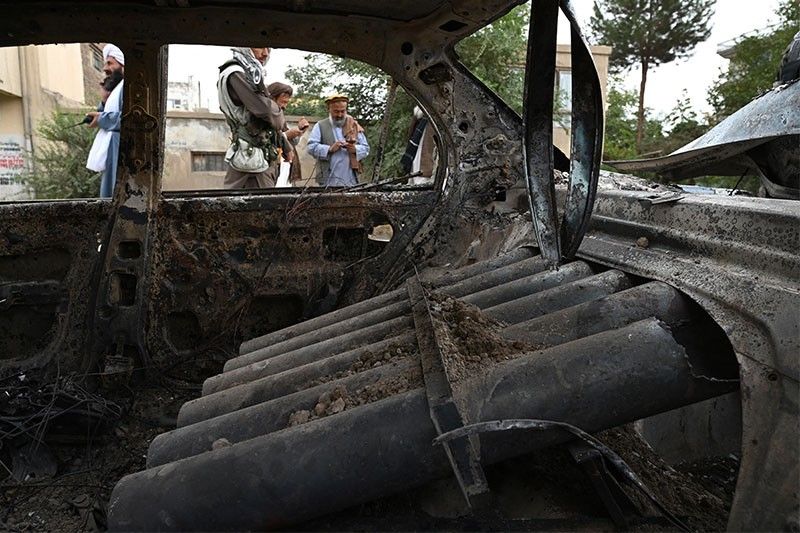Philippines 'strongly condemns' terrorist attacks in Afghanistan

MANILA, Philippines — The Department of Foreign Affairs on Monday condemned the armed conflict in Afghanistan as the government continues to repatriate Filipinos in the country.
"Meanwhile the Philippines strongly condemns the terrorist attacks and continuing threats in Afghanistan," the DFA said in a statement.
The DFA also expressed condolences to the families of the victims in the attacks in Kabul and conveyed their hopes for the swift recovery of those who were injured.
As of Monday, two more Filipinos have been evacuated from Afghanistan and are in the United Kingdom and Qatar, according to the Philippine Embassy in Islamabad.
This brings the total of Filipinos who have been in the country immediately prior to evacuation to 211.
"There are now 8 Filipinos intending to join tje government's repatriation effort," the DFA said.
Meanwhile, the 24 Filipinos remaining in the country intend to join the government's repatriation effort but through different channels and timelines.
Alert Level 4 is still raised over Afghanistan, which entails mandatory repatriation.
For emergencies, Filipinos in Afghanistan may contact the Philippine Embassy in Islamabad, Pakistan through:
- WhatsApp or Viber: +923335244762
- Messenger or Facebook: facebook.com/atnofficers.islamabadpe or facebook.com/OFWHelpPH
- Email: isbpeatn#gmail.com
Philippines will not accept refugees
Meanwhile, Foreign Affairs Secretary Teodoro Locsin Jr. said the Philippines will not accept any refugees unless the proposition is government to government.
"We will not entertain any request for asylum coming from NGOs however well-meaning or reputable or any other non-state parties," Locsin posted on Twitter.
1 THE WORLD IS ON NOTICE. With the formal end of evacuations from Afghanistan, the next stage is processing and asylum—short or long stay. The Philippines will not accept nor listen to any proposition to accept any refugees unless it is government to government and only by their
— Teddy Locsin Jr. (@teddyboylocsin) August 30, 2021
Locsin added that the agreement should be between foreign and justice ministers of countries most active in the evacuation, such as the United Kingdom and the United States.
"The temptation will be resistible to help them and help oneself to them. That will never happen under this administration or in my watch," he said.
Get the latest news as Taliban gains control of Afghanistan. Photo courtesy of Al Jazeera/AFP
Afghanistan's supreme leader said Sunday the country's women were being saved from "traditional oppressions" by the adoption of Islamic governance and their status as "free and dignified human beings" restored.
In a statement marking this week's Eid al-Adha holiday, Hibatullah Akhundzada -- who rarely appears in public and rules by decree from the Taliban's birthplace in Kandahar -- said steps had been taken to provide women with a "comfortable and prosperous life according to Islamic Sharia".
The United Nations expressed "deep concern" last week that women were being deprived of their rights under Afghanistan's Taliban government and warned of systematic gender apartheid.
Since returning to power in August 2021, Taliban authorities have stopped girls and women from attending high school or university, banned them from parks, gyms and public baths, and ordered them to cover up when leaving home.
They have also barred them from working for the UN or NGOs, while most female government employees have been dismissed from their jobs or are being paid to stay at home.
However, Akhundzada said "necessary steps have been taken for the betterment of women as half of the society".
"All institutions have been obliged to help women in securing marriage, inheritance and other rights," his statement read. — AFP
UN chief Antonio Guterres will gather international envoys at a secret location in Doha on Monday in an increasingly desperate bid to find ways to influence Afghanistan's Taliban rulers. — AFP
The UN Security Council adopted a resolution Thursday calling on Taliban authorities to "swiftly reverse" all restrictive measures against women, condemning in particular its ban on Afghan women working for the United Nations.
The resolution, unanimously adopted by all 15 Council members, said the ban announced in early April "undermines human rights and humanitarian principles."
More broadly, the Council called on the Taliban government to "swiftly reverse the policies and practices that restrict the enjoyment by women and girls of their human rights and fundamental freedoms."
It cited access to education, employment, freedom of movement, and "women's full, equal and meaningful participation in public life."
The Council also urged "all States and organizations to use their influence" to "promote an urgent reversal of these policies and practices." — AFP
G7 foreign ministers on Tuesday demanded the "immediate reversal" of a ban on women in Afghanistan working for non-governmental organisations and the United Nations.
"We call for the immediate reversal of unacceptable decisions restricting human rights and fundamental freedoms, including the latest bans prohibiting Afghan women from working for NGOs and the UN," the top diplomats said in a statement after two days of talks in Japan.
The group also slammed the Taliban authorities' "systematic abuses of human rights of women and girls and discrimination against the members of religious and ethnic minorities".
Taliban authorities triggered international outrage this month after extending a December ban on Afghan women working for non-governmental organisations to include the UN.
They have rejected criticism over the move, saying it is an internal issue that should be "respected by all sides." — AFP
The United Nations is being forced to make an "appalling choice" over whether to continue operations in Afghanistan while the Taliban government bans women from working for the organisation, the world body says.
Under their austere interpretation of Islam, Taliban authorities have imposed a slew of restrictions on Afghan women since seizing power in 2021, including banning them from higher education and many government jobs.
In December, they banned Afghan women from working for domestic and foreign non-governmental organisations, and on April 4 extended that to UN offices across the country.
In a statement Tuesday, the UN mission in Afghanistan said the ban was "unlawful under international law, including the UN Charter, and for that reason the United Nations cannot comply".
"Through this ban, the Taliban de facto authorities seek to force the United Nations into having to make an appalling choice between staying and delivering in support of the Afghan people and standing by the norms and principles we are duty-bound to uphold," it said. — AFP
- Latest
- Trending

































